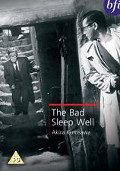
Japan 1960
Directed by
Akira Kurosawa
151 minutes
Rated PG
Reviewed by
Bernard Hemingway

The Bad Sleep Well
Compared to modern anti-corporate thrillers, The Bad Sleep Well, the story of how upstart Koichi Nishi (Toshiro Mifune) marries the lame daughter (Kyoko Kagawa) of a wealthy businessman (Masayuki Mori) and tries to bring the latter to justice, is a rather turgid affair that particularly in its closing stages throws out any attempt at a credible plot line and instead opts for histrionic hand-wringing that is more suited to the director's well-known appetite for Shakespearean theatre.
Kurosawa's target in his first independent production is corruption in post-war Japan and the culture of acquiescence that makes the dastardly deeds of anonymous corporations possible. Adapted from a novel by Ed McBain by the director and a team of writers The Bad Sleep Well is, as its title suggest, a deeply pessimistic film. It is also an uneven one that does not achieve the success of the director's comparable High And Low two years later, lumbering under drawn-out exposition, especially in the opening section, and an evidently low budget that gives the film a relatively shabby production design ill-suited to connote corporate wealth.
Notwithstanding, for Kurosawa completists it is a valuable film in which, as ever, the master's hand is well-evident in the film's often-striking visual compositions.
Want something different?





